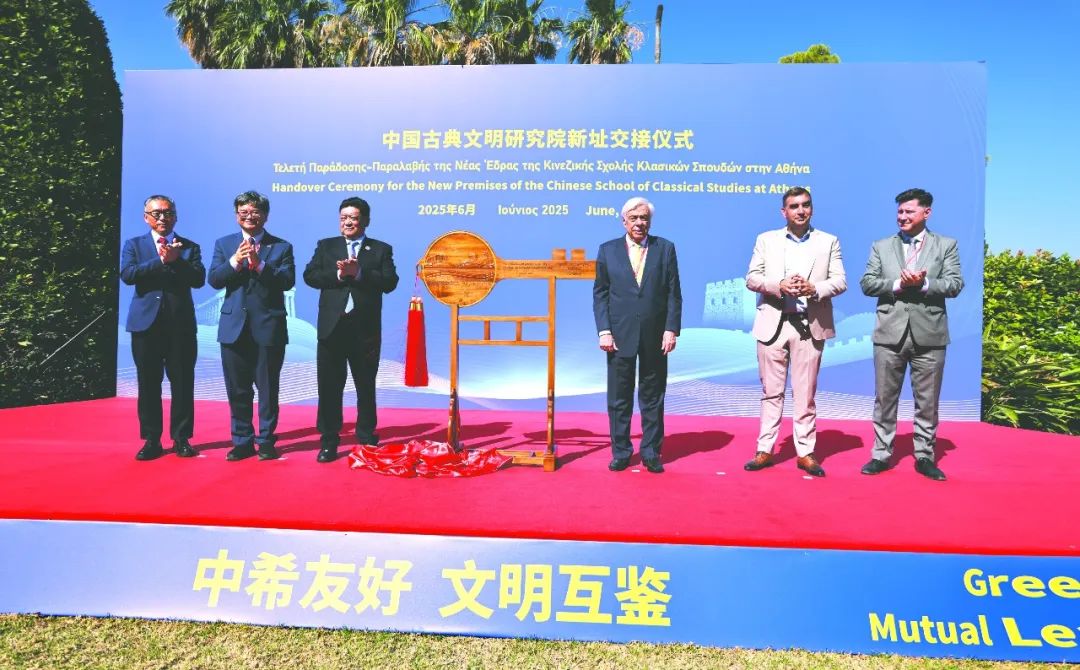

▲News Broadcast: New premises of the CSCSA officially opened
Athens,Chinese Social Sciences Today (By Yang Xue)--On 26 June local time in Athens,the Chinese School of Classical Studies at Athens (CSCSA) held a handover ceremony for its new premises in the Athens,Greek.Former Greek President Prokopis Pavlopoulos,minister-counselor of the Chinese Embassy to Greece Lai Bo,and Ioannis Konstantatos,Mayor of Elliniko,attended the ceremony and delivered remarks. In the presence of guests from both China and Greece,Prokopis Pavlopoulos and Baima Chilin,vice Chairman of the Standing Committee of the 13th National People’s Congress and president of the China Society for Human Rights Studies,jointly unveiled the plaque for the new premises of the CSCSA.

▲Handover ceremony for the new premises of the CSCSA
Photo by Yang Xue, special correspondent of China Social Sciences Today in Athens
In his address,Prokopis Pavlopoulos stated that the handover ceremony for the new premises of the CSCSA marks a historic moment and an important milestone in the development of relations between China and Greece.He noted that China and Greece are both ancient civilizations that,despite having faced many challenges throughout history,have always remained committed to safeguarding peace and stability.He emphasised that in recent years,economic cooperation between China and Greece has developed rapidly and expanded in scale, while cultural cooperation and exchanges,especially in the fields of philosophy and civilizational dialogue,remain of vital importance.The founding of the CSCSA has become a bridge of spiritual exchange between the two countries and an important platform for mutual learning among civilizations.In today’s turbulent and ever-changing international environment,where dialogue is often absent,the CSCSA bears the honorable mission of promoting exchanges and mutual learning between Eastern and Western civilizations.
Lai Bo extended his warm congratulations to the CSCSA on the occasion of its new premises,describing it as another solid step forward in deepening exchanges and mutual learning between Chinese and Greek civilizations.He stated that the CSCSA should remain true to its founding mission of promoting civilizational exchange and mutual learning,and further expand its work in classical civilization research,archaeological excavation and interpretation,academic discussions and exchanges,as well as education and training.He expressed the hope that the CSCSA would strive to become an international academic centre for classical civilization studies,build a“golden nameplate”for global classical studies,jointly explore the contemporary value of ancient civilizations,foster the inheritance, development and innovation of modern civilization,and promote the harmonious coexistence and mutual appreciation of Eastern and Western civilizations.
Ioannis Konstantatos extended a warm welcome to the CSCSA as it settled into its new premises.He said that during his visit to China,he was deeply impressed by the country’s rapid advances in science and technology,noting that many of China’s experiences are worth learning from for Greece.He expressed the hope that the CSCSA would actively contribute to promoting cultural exchanges between Elliniko and China and help boost the local economy.At the same time, he called on Greek society to attach greater importance to Chinese language learning in order to further enhance mutual understanding and friendly interactions between the two sides.
Following the ceremony,an international symposium on Human Rights Wisdom in Classical Civilizations was held alongside the release of major achievements by the Key Laboratory of Archaeological Sciences and Cultural Heritage at the CASS,as well as a themed seminar and exhibition titled Opening the Gate to East-West Civilizational Dialogue.
The symposium on Human Rights Wisdom in Classical Civilizations focused on the concept of human rights as reflected in classical civilizations.It aimed to explore,from the perspective of mutual learning among civilizations,the insights and wisdom embedded in ancient civilizations that can inform and inspire the protection of human rights in the modern world.Participants from both China and abroad agreed that human rights are an essential component of global civilization and a shared goal for all humankind.They stressed that the protection and safeguarding of human rights require the joint participation of different civilizations and nations,and called for global human rights governance to move toward a fairer,more just,reasonable and inclusive direction.
Four major outcomes in China’s scientific archaeology and cultural heritage conservation were unveiled,demonstrating the country’s continued breakthroughs in interdisciplinary integration and technological innovation.These achievements not only highlight the deep exchanges and mutual learning between Chinese civilization and world civilizations,but also present China’s unique perspectives on archaeological interpretation and historical understanding to Greece and the wider international community.These achievements include the first successful full recovery of a complex gilt crown from the Tubo Period unearthed from Tomb M1 at the Quangou Cemetery in Qinghai Province,the discovery and study of Tang Dynasty (618–907) clay dragon head architectural elements from the ancient city ruins in Xiong’an,research on alloy technology based on bronzeware excavated from the Erlitou Site,and botanical archaeological evidence confirming that native grape species in China have been continuously used for millennia.
The seminar titled Opening the Gate to East-West Civilizational Dialogue showcased China’s latest progress in tracing the origins of civilization and advancing classical studies.Chinese and Greek scholars engaged in in-depth discussions on the exchanges and comparative studies between Eastern and Western civilizations.Five Chinese scholars shared perspectives on various topics,including the creative spirit embodied in the Chinese philosophical tradition at the juncture of being and non-being,the formation of the Chinese writing system,the civilizational interactions reflected in the exchange of scripts and languages,and China’s profound research on Sanskrit and Indian civilization.Together,these insights demonstrated the global classics perspective embraced by Chinese scholars,highlighting how classical concepts can be reinterpreted through pluralistic dialogue to expand the international horizons of classical studies.The themed exhibition under the same title presented the deep historical interactions and shared values between Chinese and ancient Greek civilizations through chronological scrolls,3D-printed cultural relics, and informative panels.It underscored the contemporary significance of the idea that civilizations become richer through exchange and mutual learning.
The event was co-hosted by the China Society for Human Rights Studies,the Chinese Embassy in Greece,the CSCSA,and the Greece-China Association.More than 80 government officials,experts,scholars,and media representatives from both China and Greece participated in a range of academic and cultural exchange activities.
Source:China Social Sciences Today




